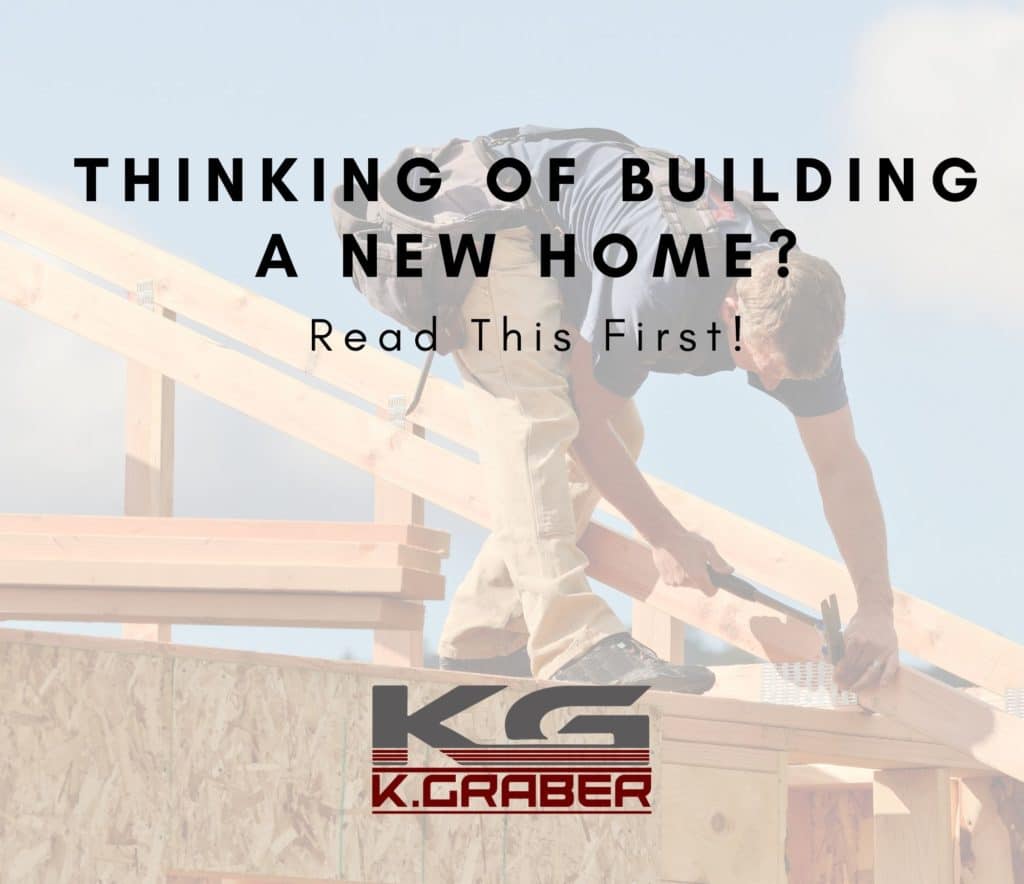
Thinking Of Building A New Home? Read This First!
If you are thinking of building a new home, congratulations!
Building a new home is a great experience as you design the home to fit your style and needs.
However, it also takes a lot of work and planning before construction ever begins.
At K Graber Construction, we know how overwhelming all those decisions can look. But don’t worry; as experienced new-home-construction contractors, we know all the ins and outs of what you should plan for, and we are here to help!
In this blog, we are going to look at eight guidelines to consider as you design and plan your own home.
Some of these you can decide on your own, and some are questions to ask your builder and contractor, but they are all important things to discuss.
Let’s get started!
Choose The Style Of Construction You Want
When building your home, there are a lot of home styles to choose from.
Each style has its own personality, and many homeowners narrow down the style they want based on several questions:
- How many bedrooms and bathrooms do you need?
- What kind of garage do you want?
- What features do you want in a dining room and living room?
- How big do you want the kitchen and pantry areas to be?
- Do you want several stories and an attic space, or do you prefer a single story?
- Do you prefer a particular type of architectural style?
Answering these questions helps you eliminate the styles that won’t work well with your dream home.
For example, if you want a single-story home with a 2-car attached garage, then a ranch-style home is a good place to start.
On the other hand, if you are looking for a country feel with larger rooms, then a modern farmhouse or colonial style is better suited for your goals.
If you want to try a less traditional, newer style, you might even consider a pole barn home, which is becoming popular for its simplicity, practicality, and cost-effectiveness. Based on a post-frame construction, pole barn homes are efficient homes built to require little long-term maintenance. And even though they are not a typical home build, they are still highly customizable.
The Location Of Your New House Should Have The Environment And Views You Want
You may be building your new home on a brand-new lot, or you may be razing an old home and replacing it.
Either way, it's important to think about what natural environment and surroundings will work well with your family's lifestyle.

Why does this matter?
Listen. This is a home that you'll live in for many years. This is the place where you'll likely raise your family.
You don't want to take the location decision lightly.
If you pick a building location without visiting it first, or just because it's cheap, you may end up with a natural environment that doesn’t match your landscape goals or style.
For instance, you may discover that the land is in a boggy location where water pools after a rainstorm, becoming a breeding ground for mosquitos. Or you may realize too that the low plains surrounding your home leave it vulnerable to wind damage.
If you are replacing your existing home, this decision is easier because you've already lived in the location.
But if you're buying a building lot, you should visit it first and carefully examine the surrounding environment.
Ask yourself:
- Is the area suitable for children or pets?
- What natural disasters is the area susceptible to?
- If you have neighbors, will you have privacy? Will you need to construct a privacy barrier?
- Does the view meet your expectations?
It's best to ask the neighbors about issues they've had with land in that area, and what sorts of home repairs have been necessary over the years.
What did they wish they knew before buying in that area?
Your expectations will vary somewhat based on if you're buying in a rural or urban setting, but if you're uncertain about the environment, don't hesitate to keep looking!
Water And Sewer Access For A New House
What is your water and sewer access like? What are the local requirements?
These questions may require the input of a realtor, neighbor, or contractor, but it's something you'll need to think about!
If you are building in a town or city with public water and sewer, you know you'll have access, but be aware that there is usually a fee to connect to these lines and often a monthly cost.
To avoid unexpected costs, acquire the necessary information about these fees early in the process.

If your property doesn’t have access to water or sewer lines, then you need to consider the cost of putting them on your property.
The best way to get a good cost estimate is to choose a local contractor who knows the area well and has a good reputation. A trustworthy contractor can provide several key pieces of information:
- The general cost to install your well and sewer system
- The overall condition of the water and soil on your land
- Any permitting or engineering requirements to install a well or sewer system
Not sure how to find a good contractor? We wrote a blog post about 9 tips for hiring a contractor!
Is There Sufficient Electric And Internet Access?
Today’s world runs on electricity and the internet. For those with a home office, having reliable internet is especially critical.
Unfortunately, these essentials are not always easily available on empty lots, especially in rural areas. However, the Internet is becoming more and more accessible, even in rural areas!
Most areas have access to entry-level DSL internet, but if high, reliable speeds are essential, then make sure you have access to cable or fiber internet.
Another option is to get Starlink Internet, which is fast, semi-reliable, and available literally everywhere in the world. Of course, since it's new, there may be some kinks to work out, but the only thing that substantially affects its reliability is heavy storms.
If you are unsure which you need, see this guide to different internet speeds and providers.
When it comes to electricity, you should be fine since America’s electrical grid covers much of the population. But be aware if you are moving to a rural lot. If the home is set back from the road and main power lines, it may be costly to equip your new home with power.
Most utility companies provide the necessary lines to give your home power, but many of them charge a fee if they need to run new lines over a certain distance.
Find out the utility company covering your new home. You or your contractor should then contact the utility to see if there is a cost associated with establishing your new electric service.

What Are The Zoning And Permitting Laws?
Make sure to work closely with your contractor to figure out what the local zoning and permitting laws are, so you can receive approval for your home’s construction with as few headaches as possible!
When discussing this with your contractor, here are several questions to ask him or her to ensure there are no surprises:
- Are permitting fees included in the contractor’s cost, or are you (the homeowner) responsible for paying them?
- Does this particular town require anything unusual that could delay the home’s construction timeline?
- Are there features of your home or building plans that might be a red flag to the permit office?
- Is your building lot zoned for homes, or is additional zoning and time required for approval to build?
While no contractor can guarantee a town’s response to a building or zoning permit application, a knowledgeable contractor should provide a good idea of the general costs and timeline.
Choose A Roofing Style: Asphalt Shingles Or Metal?
In general, you have two roofing options: asphalt shingles and metal roofs.
And while you may initially dismiss the idea of a metal roof, make sure you don't make a hasty decision without understanding the differences between shingle and metal roofs!
Let's quickly explore the different types of metal roofs available for residential roofs, so you can fully understand your options.
Standard metal roofing is usually called corrugated roofing, there is standing seam metal roofing, and there is stone-coated metal roofing.
Many homeowners shy away from metal roofing because they picture a commercial-looking roof, or they envision a bright metal color that fits poorly with their home and style.
But don’t give up on metal roofing just yet, because there is a metal roof made for homes!
Stone-coated metal roofing is one of the best metal roofing options available for homes. While it does cost more than traditional metal roofing, it is highly customizable, requires little maintenance, and lasts over twice as long as an asphalt shingle roof.
You can read more about stone-coated metal roofing versus shingles in our Definitive Guide Between Stone-Coated Metal Roofing and Asphalt Shingles, but here are several of the main points:
Asphalt Shingles:
- Cheaper than stone-coated metal roofing
- Have the “default home” look
- Usually have a 20-30 year life expectancy
- Typically begin fading and curling over time
- Need to be discarded when a new roof is installed
Stone-coated metal shingles:
- More expensive than asphalt shingles
- Highly customizable in style and color, and certain styles look identical to asphalt shingles!
- Usually have a 40-70 year life expectancy
- Because they are metal, they hold their color and shape for an extended time
- Environmentally friendly if recycled
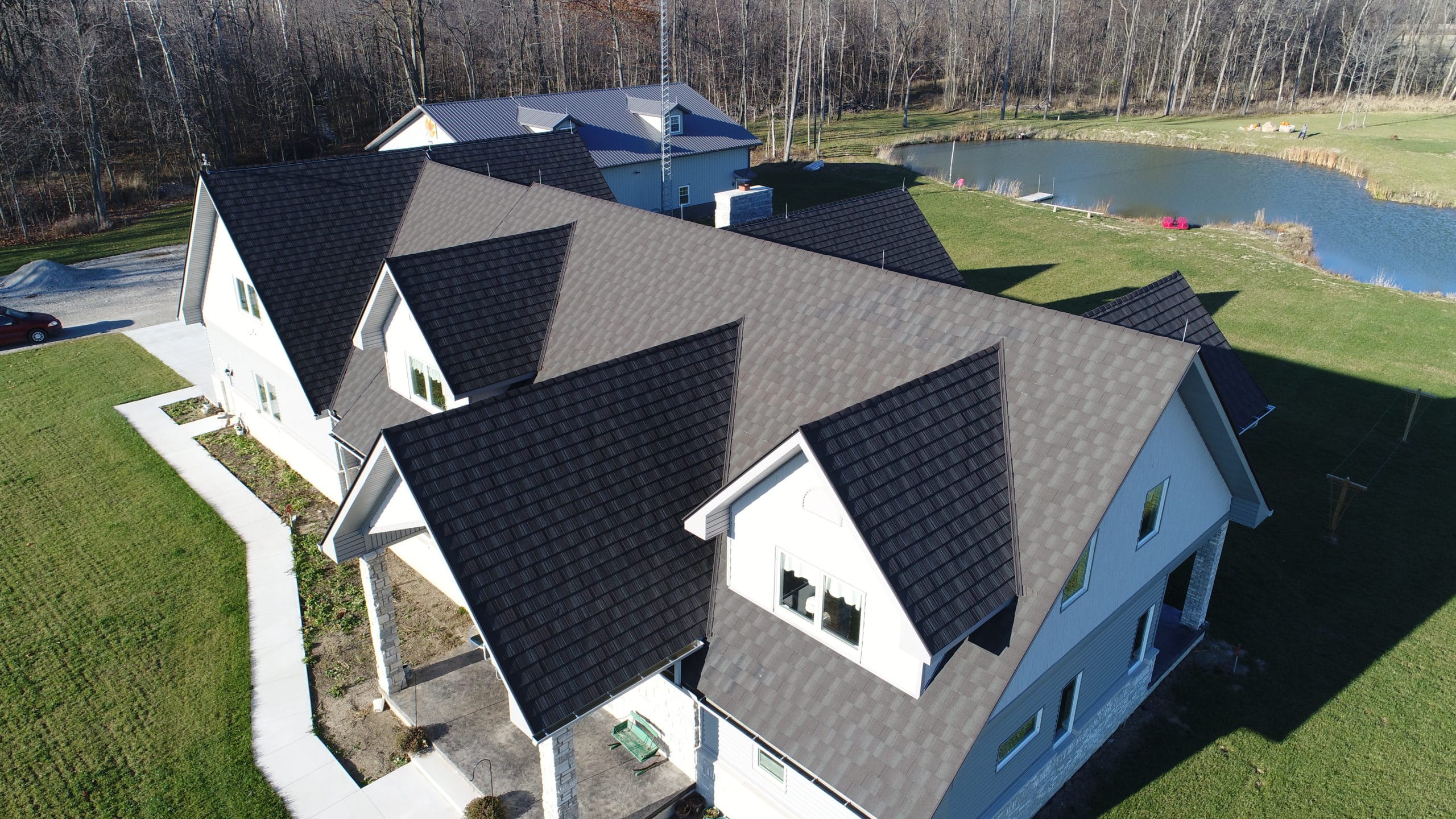
Making Your Home Energy-Efficient
Having an energy-efficient home benefits you, your home, and the environment.
A few of these benefits include:
- Environmentally friendly due to a smaller carbon footprint
- Increased comfort due to no drafts, air leaks, or hot/cold spots
- Less overall maintenance
- Use less energy (Energy Star certified homes use 10-30% less energy)
- Save on your monthly utility bill
- Better home resale value
- Peace of mind knowing you are not losing money to an ineffective home
When you discuss the building plans with your contractor, make sure you ask about your options in building materials and methods.
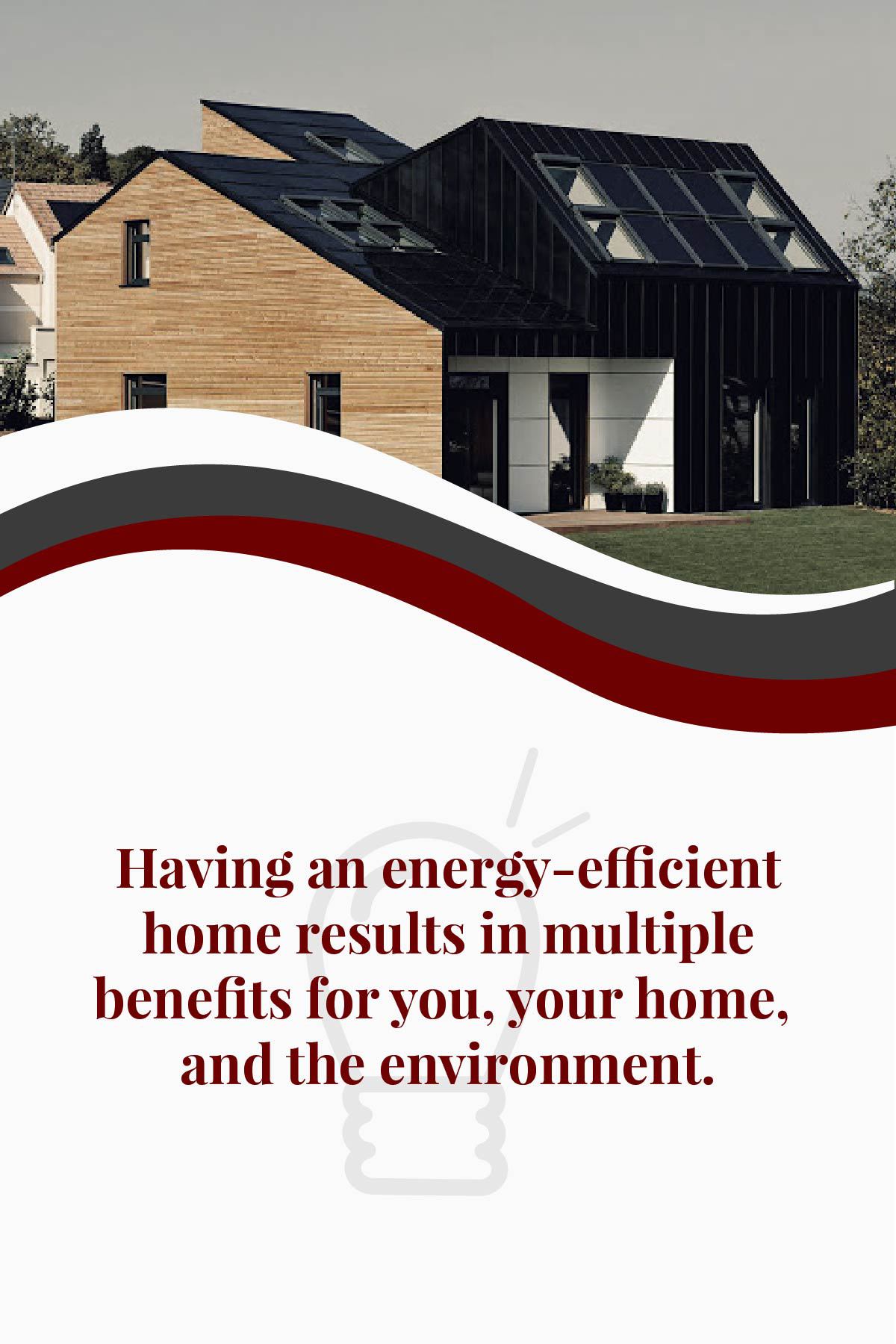
Here are a few ways to have a more energy-efficient home. (For a complete list of Energy Star products, view their Product Finder here.)
High-performance Windows and Doors
Efficient windows and doors do well in blocking infrared sunlight and regulating temperature.
These windows and doors help regulate temperature, and they also protect your interior furniture, rugs, and decor from fading.
Energy Star Appliances
When choosing appliances, lightbulbs, and water fixtures for your home, look for the Energy Star logo. This ensures you are installing efficient appliances and fixtures that use less energy and water.
Efficient HVAC System
HVAC systems, which are the heating-ventilation-air conditioning of the home, are an important part of any home. They regulate the temperature and make sure there is sufficient airflow.
Part of having an efficient HVAC system is the actual air conditioner and heating equipment used, but it is just as critical to have ductwork properly installed and well-insulated.
ICF Construction
ICF blocks, short for Insulated Concrete Forms, are an alternative to pouring concrete walls in the home’s basement and walls.
Using a concept similar to Legos, ICF Construction uses hollow blocks made of rigid thermal insulation. These blocks are stacked, securely interlocked together, and then filled with concrete.
Unlike poured concrete walls, ICF blocks remain after the concrete has dried. They remain a permanent part of the wall and help with insulation and wall stability.
ICF construction has multiple benefits:
- One of the most durable walls available
- Very energy efficient and lower utility bills
- Structural integrity in high winds
- Resistant to insect or rodent damage, mold, and rot
If this piques your interest, then read more about ICF Construction here.
And if you are interested in building an energy-efficient home, you may want to read our blog: Net Zero Homes & New Energy Homes - The Benefits And Differences.
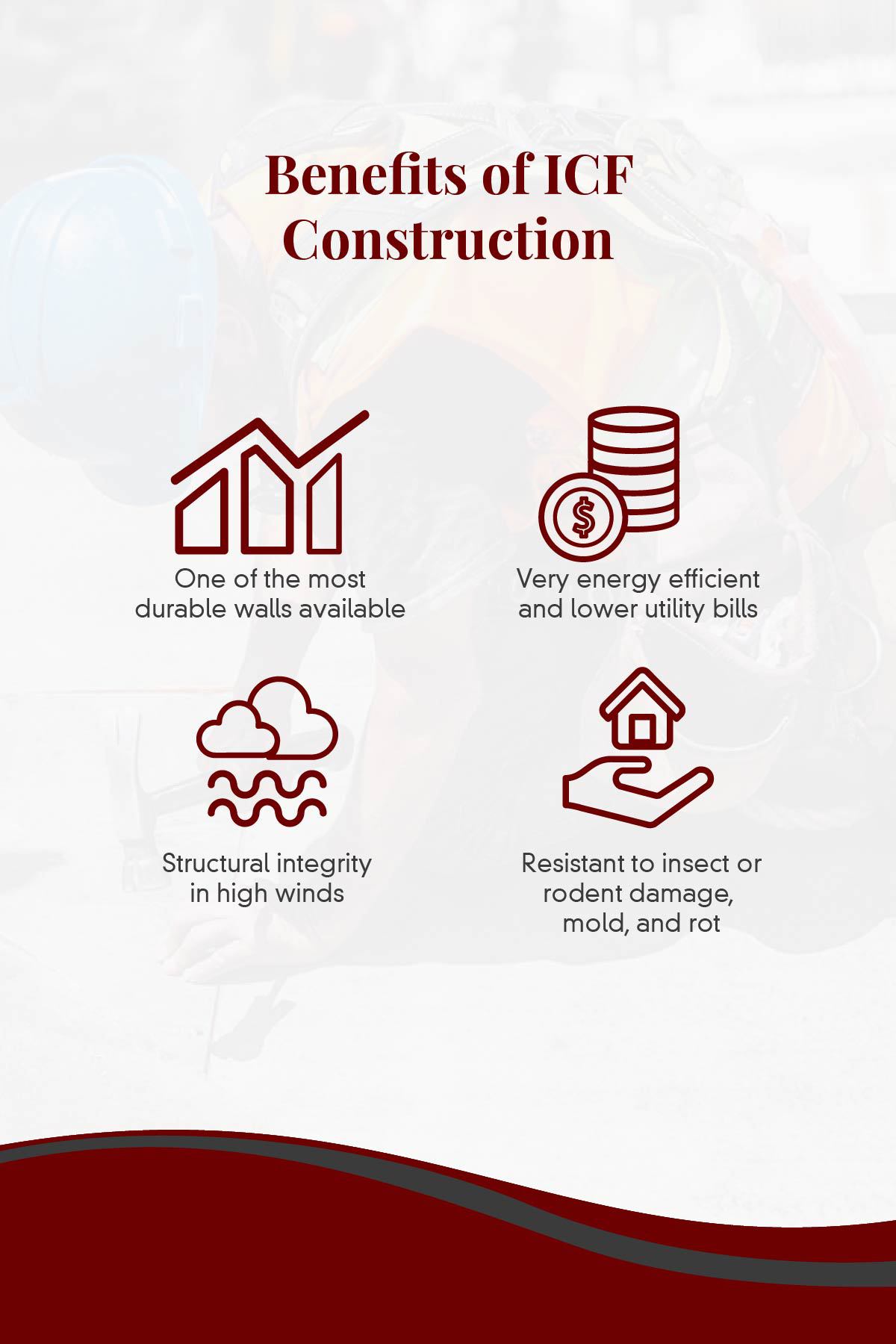
Choosing A Trustworthy Contractor
We've have left the most important point for last!
Unless you are doing most of the construction or contracting yourself, choosing the right contractor is one of the most important decisions with your new home.
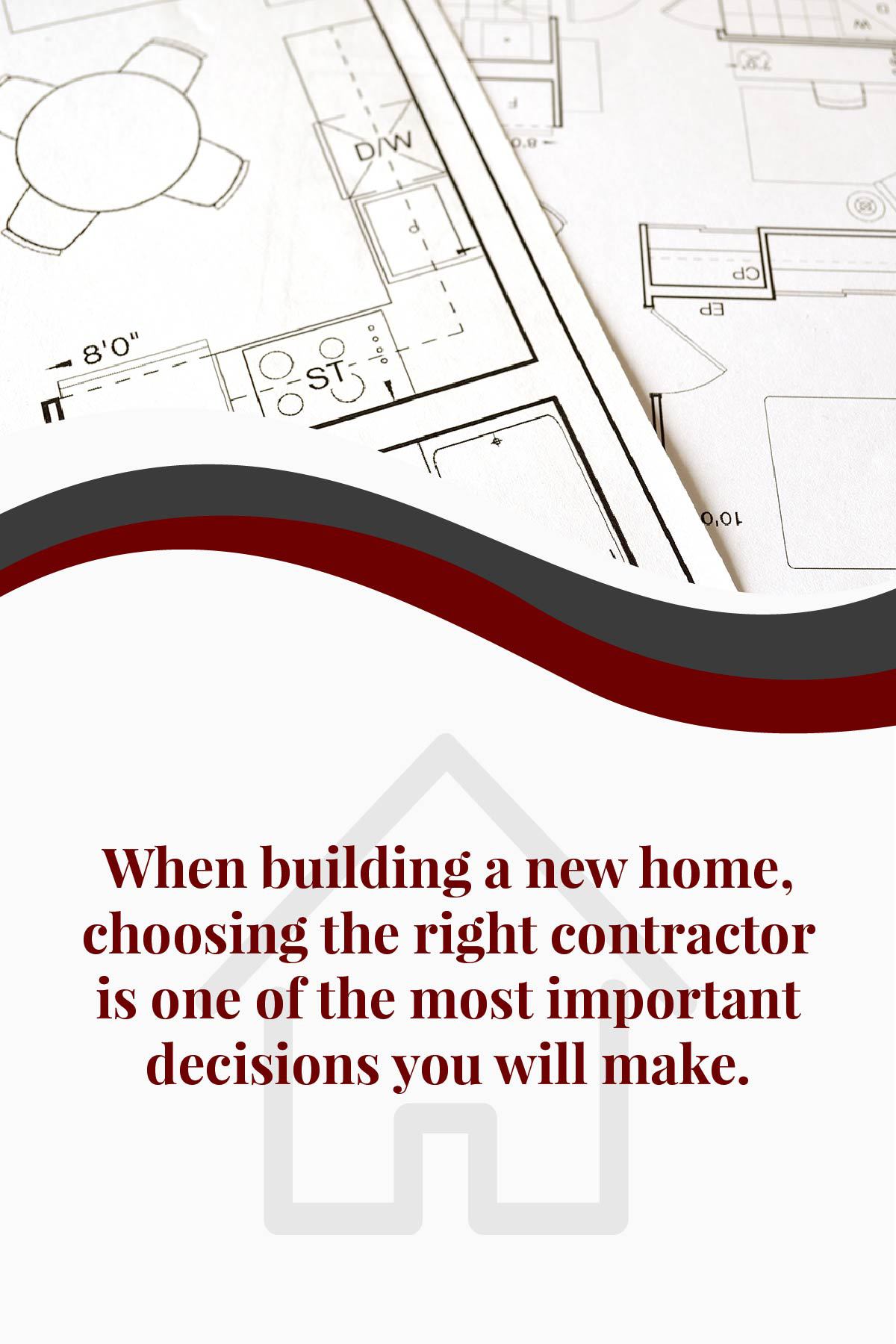
We have all heard stories about bad contractors who did shoddy work or used unethical business practices.
If you do construction work or already know a good contractor, then you are off to a good start!
If you are moving to a new area, or if your previous contractor was not trustworthy, then here are a few tips for choosing a dependable contractor.
Ask for reviews, referrals, and to see other projects.
The best way to understand a contractor’s reputation is to talk to her other customers and see the work her team has done.
In fact, if you see work you admire in a friend or acquaintance's home, be sure to ask them who their contractor was and if they were satisfied with the work!
Ask about certifications and licensing.
See what training and certifications your contractor has, and make sure his crew is covered with the proper insurance when working on your home.
Ask about their warranty.
Most parts come with a manufacturer's warranty, but see what workmanship warranty your contractor offers with the installation.
Ask them for a general job timeline.
Everyone knows construction projects can run into many unexpected glitches and issues, but your contractor should still be able to provide a general timeline for the installation.
Ask about the subcontractors they use.
Very few contractors build the whole house themselves, especially for finishing work such as electrical, plumbing, and painting.
Ask about the subcontractors they use for this work and make sure these companies have no red flags.
No contractor is perfect. They are human and sometimes make mistakes.
The difference is that a trustworthy contractor will own up to their mistakes and make them right.
Asking questions and doing research gets you closer to a contractor you can trust with your new home.
Conclusion
There is a lot to consider when building your new home, but don’t be overwhelmed with the decisions! Instead, enjoy the process of making your dream home for your family.
If you follow the eight guidelines we covered, you will have a head start in designing and building your dream home.
If you live in Central or Northern Indiana and are starting this home-building journey, then contact K. Graber Construction today! We'd love to help you out with whatever project you're dreaming up.
Besides new home construction and addition and remodel services, we offer:
We work hard to be a trustworthy contractor, and we are more than happy to let you see our previous work or talk to former customers. You can also read reviews of our work.
Contact us today to see how our team can help you make your dream home in Indiana.
We look forward to meeting you!

